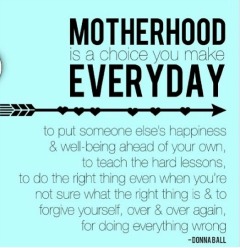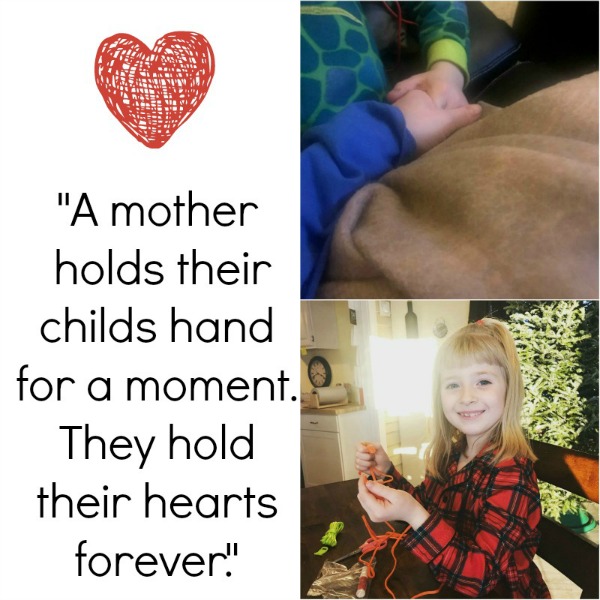How do you make the most important decisions for your children?? From breast-feeding to formula feeding, from pacifiers to the cry it out method, from organic foods to whatever is easiest because you may have a busy day ahead, from time-outs to never saying “no”, from what daycare to what pre-school, from what sport to play to what date they can go on…….it’s an endless process of decision-making I’ve come to notice and I’m only at the beginning, I’m only for seeing what’s in my future at this point in time. We all make decisions that best fits our needs, we make decisions based off of what we can afford, what we are able to do and what is best for our particular children.
It’s tough, the past couple of weeks I’ve had to make the decision of what p/t daycare provider to choose. There are some days I regret being a SAHM because I feel like my child that is so deprived of social awareness, of other adult stimulation, of just the outside world in general. My daughter is just now starting to show her personality and some days it scares me! No seriously, it does! It’s why we decided to send her to daycare two days a week because we think she needs it. It’s not that I can’t teach her how to eat with a fork, sleep at a certain time or to not hit other kids. I’ve done everything a SAHM can do, I go to mommy groups, I have play dates, I get out a few times a week, I read and play with her everyday, I guess I’ve just come to realize there are some things that I just can’t teach her. I can’t teach her to be social, I can’t teach her to trust other adults, I can’t teach her how to make a friend, I just have to trust society to do it for me I suppose. Meaning you let her go and let her experience these things on her own. Hey if my mom could pick and choose every friend I made, every boyfriend I had, every heartache I didn’t have, life would have been grand!
What other decisions do we make as mothers? It’s always something. Well the next major one I’ll be working on is potty training, disciplining and preschool……..oh fun! So I did some investigation and thought I would share some of it with you other momma’s out their.
POTTY TRAINING:
I found that the babycenter had a great article on Successful Potty Training for Girls….if you don’t have a girl, there is a selection for boys too! But this gives you a check list to see if your child is mentally and physically ready to start. I could tell right away just by answering a few questions that my daughter (16 mths) isn’t even ready to begin, I only took the questionnaire because my daughter isn’t that far from 18 mths and I wanted to know if she is going to be ready soon. We all know every child is different. One part of the article I found most interesting was this “There’s no point trying to get a head start; studies show that when parents begin potty training before a child is physically or emotionally able, the process simply takes longer to complete. In other words, you arrive at your destination at the same time, no matter when you start.” That made me feel better, that way I know their isn’t really a “right” time, or that I’m necessarily wrong with when I’m starting LOL….http://www.babycenter.com/0_successful-potty-training-for-girls_11653.bc?page=1 Check this out for more answers.
DICINIPLINING:
This is a tough subject for any parent but it’s also a tough subject to talk about as parents because we all have our own opinions, which is totally understandable. Even my own husband and I have different opinions, if it’s one thing my mother said that has always stuck with me it’s “Raising kids together as a couple is the hardest thing you’ll ever have to do.” Now I get it! I guess to me the most important part is choosing a system that works for you and your other half.
Here are Ten ways to get in sync with your partner on discipline. According to Jane Nelsen, coauthor of the Positive Discipline series.
Children can weather subtle differences in their parents’ discipline styles: Maybe Mom is quicker to rein in rudeness while Dad’s the one who freaks out about spilled juice on the couch. No big deal.
But researchers say that children whose parents have significantly different child-raising styles are more likely to have behavior problems. If Dad’s a pushover and Mom rules with an iron fist, it’s confusing for kids.
Of course, it’s unrealistic to expect that as parents you and your partner will think and act exactly the same way, says The key, she says, is to avoid getting locked into a power struggle with your mate.
To help break the old habits and find strategies you can both live with, you’ll need to have a heart-to-heart with your mate in which you agree on some basic strategies to move forward with. Our panel of discipline experts walks you through the ten key steps of creating a discipline partnership:
1. Talk with your partner about how discipline was handled when the two of you were growing up. Parenting patterns are often repeated, so this can give you each insight into the other’s style.
2. Ask your partner why he disciplines the way he does, then listen without interrupting. Be patient and respectful. Ask yourself why you’re opposed to your partner’s method. What are you afraid will happen?
3. Ask what qualms your partner has about your discipline style.
4. Explore openly all the options on the table, balancing pros and cons. Develop a shared set of rules and consequences you can both agree to try, then be prepared to adjust or return to these a few weeks later if it’s not working for everyone.
5. As you begin your new, shared strategy, settle discipline disputes as they arise, one at a time, in a calm, private place away from little ears.
6. Compromise — but present a united front to your children. If they see you’re working together, they’re less likely to try to play you against each other. Vow not to badmouth your spouse’s disciplining techniques in front of your child.
7. If you suspect your child is playing the two of you against each other (“Dad lets me clear the table after I watch my show”), tell her you’ll give her an answer once you’ve spoken with her father. Or tell her she needs a “yes” from both parents before she proceeds. Remember: Not all discipline decisions demand an answer right now.
8. If your partner seems discouraged — even if you’re not thrilled with how he handled a situation — be generous with encouragement and empathy. Find a private moment to check in with a gentle, nonjudgmental opener like, “That was rough. I bet you’re feeling upset right now. Do you want to talk about it?”
9. If you have school-age children, post clear family rules and review them with the kids to reinforce the message that you and your partner are a team. Involving older children in establishing rules often inspires better cooperation. Have a plan for revisiting rules and consequences so they can be adjusted as your kids age.
10. What if your partner refuses to even entertain a talk on the subject? That’s tough, but don’t give up. Ask him to make a list of your child’s behaviors that drive him crazy, plus his ideas about how to extinguish them.
If you cop a “there’s only one right way and it’s my way” attitude, it will just keep you locked in a battle zone. Instead, try to understand the logic behind your partner’s approach. If all else fails, give him a book or article on the topic or solicit the help of a teacher, school counselor, or therapist. For more information on specific disciplinarians check here: http://www.babycenter.com/toddler-discipline
PRESCHOOL:
Here is a great article from a fellow blogger that I received, and while talking to a friend of mine today I see that it’s not only on my mind so maybe talking about it with other mommy friends can help! http://lifeasmom.com/2012/03/planning-for-preschool.html?utm_source=feedburner&utm_medium=email&utm_campaign=Feed%3A+lifeasmom%2FoGdA+%28Life+as+Mom%29
What are the advantages of preschool?
Preschools are inspected for licensing purposes, teachers are supervised (many groups and classrooms have more than one teacher), and a director oversees the entire operation. This regulation and order can be very reassuring. And your child benefits from this formality, too. Many preschools offer children a structured environment.
Other benefits include clearcut rules for parents to follow (specific pickup and drop-off times, for example), low-fuss installment payments, and the opportunity to meet other parents, who may be able to lend support and babysitting time.
Good programs feature a wide variety of fun activities — including singing, dancing, arts and crafts, storytelling, free play, and both indoor and outdoor games and projects — designed to teach children different skills. Children may also learn some academic basics such as counting and the alphabet. Plus, most preschool teachers have training in early childhood education, so they know what to expect from your child developmentally and are able to help her along accordingly.
Children in preschool also have the opportunity to socialize with other kids their age, an appealing advantage for parents who used a nanny or relative care when their children were younger. “Our private day school has turned out to be the best setting for our two-and-a-half-year-old daughter,” says Andrea Shah, a BabyCenter member from San Mateo, California. “She now has a core group of friends who will move with her to a new classroom each year.”
A final advantage — especially when compared to nanny care, home daycare, and relative care — is that a sick provider doesn’t mean a last-minute scramble for emergency childcare. Your child may miss her favorite teacher, but when Miss Jones gets the flu someone is always available to step in.
What are the disadvantages?
Children benefit from interacting with their peers, but in some preschools, emphasis on groups can overshadow the individual attention kids need and crave. This is a particular risk if the preschool doesn’t follow the National Association for the Education of Young Children’s recommended teacher-child ratio of no more than ten preschoolers per staff member. Even that number is high; a ratio of 1:8 or 1:9 is better for four-, five-, and six-year-olds, and three-year-olds do best with one teacher for every seven children.
Though many parents appreciate the clear rules and guidelines imposed by preschools, understand that, as with any kind of group care, those guidelines may sometimes be inconvenient for you. If your preschool is closed for holidays or for any other reason (such as staff training), you’ll have to find backup care; if they require children to be toilet trained and your daughter isn’t ready for the potty, they may not let her attend. You may also have to pay high fees for late pickups and end up having to stay home with your child if the preschool says she’s too sick to be there.
Finally, some schools’ programs may not leave room for your child to explore and learn at her own pace. If the schedule seems inflexible when you visit, keep looking.









